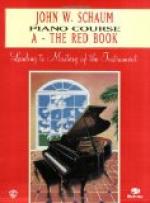ON MEMORIZING
“In regard to memorizing piano music I have no set method. The music comes to me I know not how. After a period of deep concentration, of intent listening, it is mine, a permanent possession. You say Leschetizky advises his pupils to learn a small portion, two or four measures, each hand alone and away from the piano. Other pianists tell me they have to make a special study of memorizing. All this is not for me—it is not my way. When I have studied the piece sufficiently to play it, I know it—every note of it. When I play a concerto with orchestra I am not only absolutely sure of the piano part, but I also know each note that the other instruments play. Of course I am listening intently to the piano and to the whole orchestra during a performance; if I allowed myself to think of anything else, I should be lost. This absolute concentration is what conquers all difficulties.
ABSTRACT TECHNIC
“About practising technic for itself alone: this will not be necessary when once the principles of technic are mastered. I, at least, do not need to do so. I make, however, various technical exercises out of all difficult passages in pieces. I scarcely need to look at the printed pages of pieces I place on my recital programs. I have them with me, to be sure, but they are seldom taken out of their boxes. What I do is to think the pieces through and do mental work with them, and for this I must be quiet and by myself. An hour’s actual playing at the piano each day is sufficient to prepare for a recital.
“It must not be thought that I do not study very seriously. I do not work less than six hours a day; if on any day I fail to secure this amount of time, I make it up at the earliest moment. During the summer months, when I am preparing new programs for the next season, I work very hard. As I said, I take the difficult passages of a composition and make the minutest study of them in every detail, making all kinds of technical exercises out of a knotty section, sometimes playing it in forty or fifty different ways. For example, take the little piece out of Schumann’s Carneval, called ‘The Reconnaissance.’ That needed study. I gave three solid days to it; that means from nine to twelve in the morning, and from one to five in the afternoon. At the end of that time I knew it perfectly and was satisfied with it. From that day to this I have never had to give a thought to that number, for I am confident I know it utterly. I have never had an accident to that or to any of my pieces when playing in public. In my opinion a pianist has a more difficult task to accomplish than any other artist. The singer has to sing only one note at a time; the violinist or ’cellist need use but one hand for notes. Even the orchestral conductor who aspires to direct his men without the score before him, may experience a slip of memory once in awhile, yet he can go on without a break. A pianist, however, has perhaps half a dozen notes in each hand to play at once; every note must be indelibly engraved on the memory, for one dares not make a slip of any kind.




